人教版 必修一 Unit1 Friendship-Using language课件(共21张PPT)
高一人教版英语必修1课件 Unit 1 Friendship Using Language

注意:fall in love表示动作,be in love表示状态,后面 接宾语时,都需要加介词with。 [巩固训练] 一句多译 他们相爱已有三年了。 (1)______________________________________________ (2)______________________________________________ (3)______________________________________________
(3)Readers can________quite well without knowing the exact meaning of each word. A.get over C.get along
答案:C
B.get in D.get through
本题题意:在不知道每个词的确切含义的情 along/on (=to
be_grateful
if
you
could
give
me
some_advice. 如果你能给我些建议,我将很感激。 4.Although I try to talk to my classmates, I still find it hard to make good friends with them. 尽管我努力去和我同学说话,但我仍然觉得很难和他们 交朋友。
答案:(1)They have been in love with each other for three years. (2)They fell in love with each other three years ago. (3)It's three years sincother.
(2)—How are you managing to do your work without an assistant? —Well, I________somehow. A.get along C.watch out B.come on D.set off
人教版高中英语必修一教案:Unit1FriendshipUsinglanguage3

必修一Unit 1 FriendshipUsing language(A letter from a student to the editor of The 21st Century)AimsTo listen to a letter about friendshipTo speak about a questionnaire about friendshipTo write advice about friendshipTo write a few lines describing a friendProceduresI. Warming up1.Read the letter to Miss Wang and find out what was upsetting Lisa.2.Listen to what Miss Wang says, and then answer the questions in Exercise 2.3.Listen to the tape again and try to spell out the missing words in Ex 3.II. Talking about designing a questionnaireWork in groups of four. Design a questionnaire to find out what kind of friends your classmates are. Ask the Students to use the quiz in the Warming Up as an example.Note: The students should be talking while they are doing the task. This provides the students with the opportunity to practise expressing thought and concern in matters of immediate concern and interest. Tell the students to follow these steps:Step1: In your group, come up with four situations among friends. Design four questions accordingly with three possible answers.Step2: Put the four questions together and form a questionnaire.Step3: Check the questionnaire through and try it out on your own group.Step4: Share your questionnaire with an other group and try each other’ s questionnaires.Sample questionnaire:This questionnaire has four questions, and each question is followed by a set of possible answers. Please readthe questions, and then consider which response fits you best.1.Why am I close friends with this person now?A.Because being friends with him/her helps me feel important.B.Because my friend would be upset if I ended the relationship.C.Because he/she is someone I really enjoy sharing emotions and special events with.2. Why do I spend time with my friend?A. Because my friend would get mad at me if I didn’ t.B.Because it is fun spending time with him/her.C.Because I think it is what friends are supposed to do.3.Why do I listen to my friend’ s problems, or to whatdhasmy tofriensay?A.Because my friend praises me and makes me feel good when I do.B.Because it ’ s interesting and satisfying to be able to share like that.C.Because I really value getting to know my friend better.4.Why do I keep promises to my friend?A.Because I believe it is an important personal quality to live up to my promises to a friend.B.Because it would threaten our friendship if I were not trustworthy.C. Because I would feel bad about myself if I didn’ t.Scoring Sheet:A 1point A 1point A1 pointQ1 B 2points Q2 B 2points Q3B2 points Q4C 3points C 3points C3 points A3 points B2 points C1 point☆ 4~6 points: You are not a good friend. You either neglect your friend’s needs or just do what he/she wants you to do. You should think more about what a good friend needs to do.☆7~9 points: You are a good friend but you sometimes let your friendship become too important, or you fail toshow enough concern for your friend’ s needs and feelings. Try to strike a balance between your friendyour own responsibilities.☆10+ points: You are an excellent friend who recognizes that to be a good friend you need balance your needsand your friend’ s. Well done.Students work in groups and try their own questionnaires in the school to collect more information about studentsreflection of the values of friendship.III. Guided writing1.Read the letter to the editor from Xiaodong and make sure you know what problem Xiaodong has.2.Discuss in groups of four. Think what advice you can give Xiaodong.3.Write your advice to Xiaodong as an editor individually.Sample writing:Dear Xiaodong,Some people like talking with others, but some people are shy. If you fall into the second group, it can be hard to make friends. But you can change the situation.What are you interested in? If you like basketball, for example, you could talk with some of your classmates who like basketball. The easiest way to start talking to people is to find something you have in common.If you are standing beside a group of your classmates, join in their discussion if you know something about the subject they are discussing. But if you don ’ t,you shouldn ’feelt afraid to say, for example, “ Thatsounds interesting, what is it about?” Once you start talking to one person, it will get easier to talk to others. Find one person you have something in common with, and once you become friends with him, his friends willstart talking to you too.Good luck!EditorIV . Writing assessment1.Can you give Xiaodong some good advice?2.I s your letter well developed?3.Are your ideas well organized to the point?4.Do you have a good choice of words and idioms in your writing?5.Do you get a good mastery of complex structures of language?6.What kind of mistakes have you made in your writing? What can you do to avoid such mistakes?V. Further ApplyingHere are some proverbs about friends and friendship. Read them carefully and pay attention to the sentence stress and intonation. Then write a passage. Choose some you agree and explain why. Then choose some you disagree and explain why。
最新人教版高中英语必修一教案:Unit-1-Friendship-Using-language
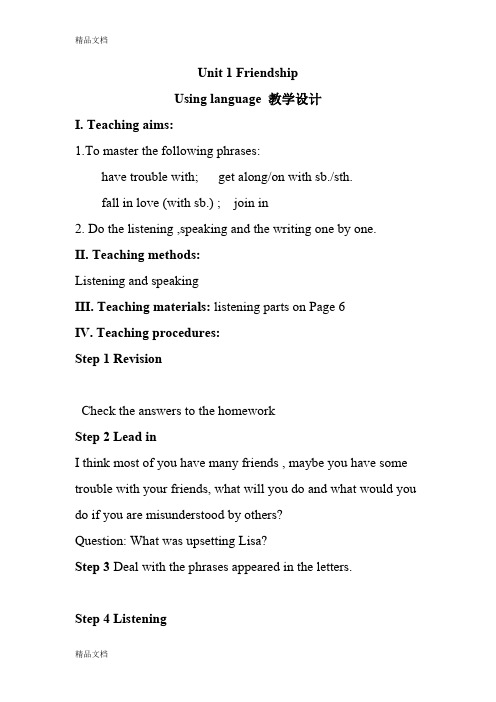
Unit 1 FriendshipUsing language 教学设计I. Teaching aims:1.To master the following phrases:have trouble with; get along/on with sb./sth.fall in love (with sb.) ; join in2. Do the listening ,speaking and the writing one by one.II. Teaching methods:Listening and speakingIII. Teaching materials: listening parts on Page 6IV. Teaching procedures:Step 1 RevisionCheck the answers to the homeworkStep 2 Lead inI think most of you have many friends , maybe you have some trouble with your friends, what will you do and what would you do if you are misunderstood by others?Question: What was upsetting Lisa?Step 3 Deal with the phrases appeared in the letters.Step 4 ListeningBesides you Lisa also asks Miss Wang of Radio for Teenagers for help. What advice does Miss Wang give to Lisa? Let’s liste n to what she says.1. Listen again and fill in the blanks on Page6 Ex22. Listen for 3 times and do Ex3. (just try, but not the task must do)☆LISTENING TEXTDear Lisa,There is nothing wrong with you and this boy being friends and studying together.And no matter what other students say, it is possible for a boy and a girl to be just good friends.Ending your friendship with this boy would be a stupid thing to do.Not only would you lose a good friend, but you would also lose someone who is helping you with your studies.Teenagers like to gossip, and they often see something that doesn't exist.Perhaps they can't understand your friendship with this boy.But that's no reason to throw it away.You should feel sorry for those students who have never enjoyed such a friendship.My advice is to ignore your gossipingclassmates.That way you will show them that you are more grown up than they are.Yours,Wang FeiStep 5 Post-listeningDo you agree with Miss Wang’s advice?Discuss it in small groups.Step 6 Assignments1.2.Finish your opinion to Miss Wang’s advice.3.Talk with your classmates about the friendship betweenLisa and her friend.。
人教版高中英语必修一高一Unit1FriendshipUsinglanguage

Answerthefollowingquestions. 1.LisawrotetoMissWangtoask for____a_dv. ice
2.Lisa’sproblemisthatShehas____ trouble withherclassmates.Someofthemstarted g_o_ss_i_p_in_gaboutherfriendshipwithaboy.
What’smore,activelyjoinyourclassmatesintheirdiscu ssionsifyouknowsomethingabouttheirsubjects.Butif youdon’t,youshouldn’tbeafraidtosay,for5,“That6int eresting.Whatisitabout?”7youstarttalkingtooneper
2Listentothetapeandtrytospellthe wordsasyouheartheirpronunciation.
1.There’snothingwrongwithyouand thisboy______friendsand________ together. 2._______yourfriendshipwiththis boywouldbea______thingtodo.
YouradviceforXiaoDong 1.toaskpeopletheirlikesanddislikes tofindclassmateswiththesame interests 2.tojoinindiscussionsandshow interestinotherpeople’sideas togettoknowdifferentpeopleand letthemseeyouarefriendly
高中英语:Unit 1 Friendship Using language(新人教必修1)
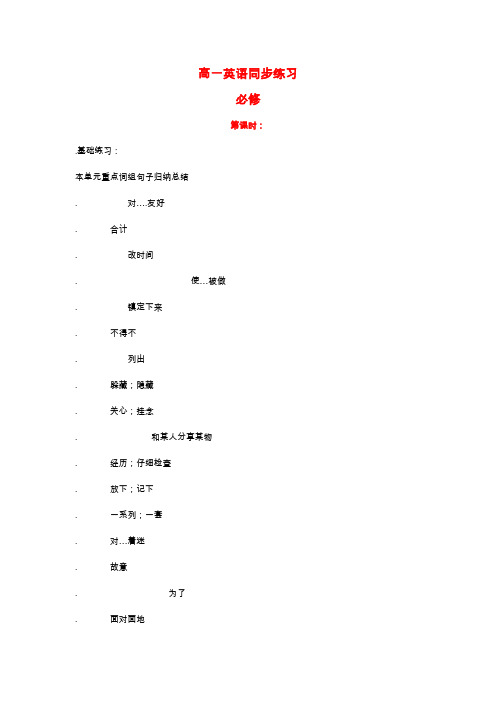
高一英语同步练习必修第课时:.基础练习:本单元重点词组句子归纳总结. 对….友好. 合计. 改时间. 使…被做. 镇定下来. 不得不. 列出. 躲藏;隐藏. 关心;挂念. 和某人分享某物. 经历;仔细检查. 放下;记下. 一系列;一套. 对…着迷. 故意. 为了. 面对面地. 与…相处. 收拾,打理行装. 按照;根据…所说. 同某人闹意见;做…有困难. 和…交际. 终止友谊. 试验;试用. 参加(活动). 到处. 注意,留心某事. 相爱. 无知的. () 骗取某人某物. 有做…的习惯句子归纳:…我想知道是否…. ……难怪……. ’…这是因为…. 此从句中不能用或代替. ? 你认为一个好朋友应该是什么样的呢?. , ., …在遛狗时,你不小心让狗挣脱了绳子,结果狗被车撞了。
(当, , , 等引导的时间状语从句中的主语与主句的主语一致时,可将从句中的主语和动词省去。
). , ? 你想有一位无话不谈、能推心置腹的朋友吗?. ’ . 我已经很久不能去户外,所以我变得对自然界的所有东西都很感兴趣。
. , , . 我记得非常清楚,曾有一段时间,湛蓝的天空、鸟儿的歌唱、月光和鲜花,从未使我心醉神迷过。
. ’ .这是我一年半以来第一次目睹夜晚。
() . .这是我第一次来美国。
( ) .. . 如果您给我提些建议,我会非常感谢的。
(…委婉客气提出请求). ’ . 记日记对你来说是个好习惯。
. …(她发现解决……有困难)猜猜下列句子中的含义。
. .. .. ’ .[点拨] 主要用作及物动词,意为“忽视;忽略;不理睬”。
[联想] . 无知的 . 无知;不了解[拓展] ... 对……不了解,不知道() 对……不了解,不知道的用法[观察]. .. , .. .. .[归纳] 意为“为了……”,表示目的;在用法和意义上相当于结构,但是结构可以用于句首、句中,而多用于句中。
其否定式分别为:和。
[拓展] 和在句中表示目的时,常可以转化成或引导的目的状语从句。
高中英语人教版高一必修1教案: Unit 1 Friendship using language教案(系列四)
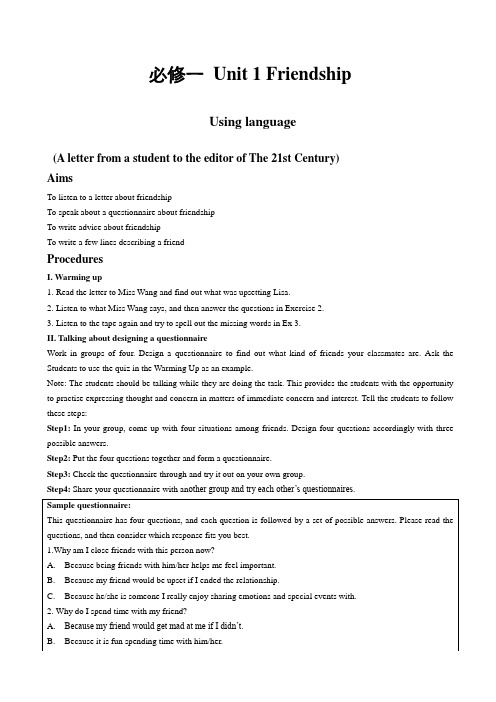
必修一Unit 1 FriendshipUsing language(A letter from a student to the editor of The 21st Century)AimsTo listen to a letter about friendshipTo speak about a questionnaire about friendshipTo write advice about friendshipTo write a few lines describing a friendProceduresI. Warming up1. Read the letter to Miss Wang and find out what was upsetting Lisa.2. Listen to what Miss Wang says, and then answer the questions in Exercise 2.3. Listen to the tape again and try to spell out the missing words in Ex 3.II. Talking about designing a questionnaireWork in groups of four. Design a questionnaire to find out what kind of friends your classmates are. Ask the Students to use the quiz in the Warming Up as an example.Note: The students should be talking while they are doing the task. This provides the students with the opportunity to practise expressing thought and concern in matters of immediate concern and interest. Tell the students to follow these steps:Step1: In your group, come up with four situations among friends. Design four questions accordingly with three possible answers.Step2: Put the four questions together and form a questionnaire.Step3: Check the questionnaire through and try it out on your own group.Step4: Share your questionnaire with an other group and try each other’s questionnaires.1. Read the letter to the editor from Xiaodong and make sure you know what problem Xiaodong has.2. Discuss in groups of four. Think what advice you can give Xiaodong.3. Write your advice to Xiaodong as an editor individually.Sample writing:Dear Xiaodong,Some people like talking with others, but some people are shy. If you fall into the second group, it can be hard to make friends. But you can change the situation.What are you interested in? If you like basketball, for example, you could talk with some of your classmates who like basketball. The easiest way to start talking to people is to find something you have in common.If you are standing beside a group of your classmates, join in their discussion if you know something about the subject they are discussing. But if you don’t, you shouldn’t feel afraid to say, for example, “That sounds interesting, what is it about?” Once you start talking to one per son, it will get easier to talk to others.Find one person you have something in common with, and once you become friends with him, his friends will start talking to you too.Good luck!EditorIV. Writing assessment1. Can you give Xiaodong some good advice?2. I s your letter well developed?3. Are your ideas well organized to the point?4. Do you have a good choice of words and idioms in your writing?5. Do you get a good mastery of complex structures of language?6. What kind of mistakes have you made in your writing? What can you do to avoid such mistakes?V. Further ApplyingHere are some proverbs about friends and friendship. Read them carefully and pay attention to the sentence stress and intonation. Then write a passage. Choose some you agree and explain why. Then choose some you disagree and explain why。
高中英语人教版必修1课件 Unit1Friendship Using language 课件(系列一)ppt版本

But other students have started gossiping. They say that this boy and I have fallen in love. This has made me angry. I don’t want to end the friendship, but I hate others gossiping. What should I do?
2 Listen to the tape and try to spell the words as you hear their pronunciation.
1. There’s nothing wrong with you and this boy _b_e_i_n_g_ friends and _st_u_d_y_i_n_g_ together.
人教版 必修一
Unit 1 Friendship
Period 4 Using Language
Reading and Listening
Do you think there is real friendship between boys and girls?
I think so. / I don’t think so. I agree. / I don’t agree. That’s correct. Of course not. Exactly. I’m afraid not.
4. My advice is to _ig_n__o_re_ your classmates. That way you will _s_h_o_w_ them that you are more _g_r_o_w_n_-_u_p_ than they are.
精编人教版高中英语必修1教案: Unit1Friendship Using language 教案(系列四) Word版
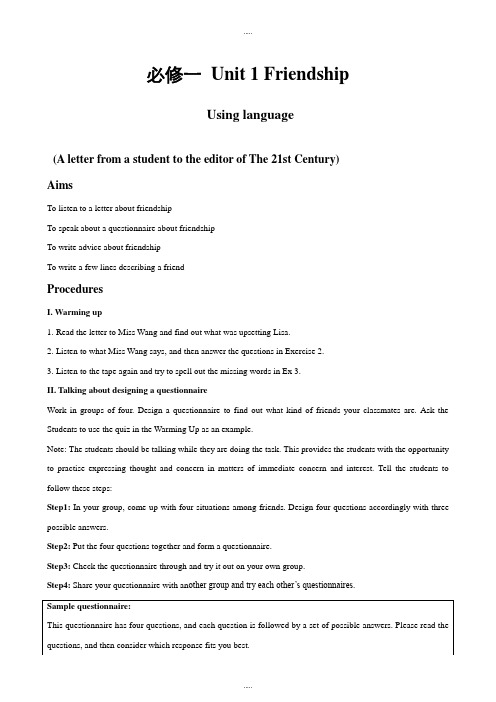
必修一Unit 1 FriendshipUsing language(A letter from a student to the editor of The 21st Century)AimsTo listen to a letter about friendshipTo speak about a questionnaire about friendshipTo write advice about friendshipTo write a few lines describing a friendProceduresI. Warming up1. Read the letter to Miss Wang and find out what was upsetting Lisa.2. Listen to what Miss Wang says, and then answer the questions in Exercise 2.3. Listen to the tape again and try to spell out the missing words in Ex 3.II. Talking about designing a questionnaireWork in groups of four. Design a questionnaire to find out what kind of friends your classmates are. Ask the Students to use the quiz in the Warming Up as an example.Note: The students should be talking while they are doing the task. This provides the students with the opportunity to practise expressing thought and concern in matters of immediate concern and interest. Tell the students to follow these steps:Step1: In your group, come up with four situations among friends. Design four questions accordingly with three possible answers.Step2: Put the four questions together and form a questionnaire.Step3: Check the questionnaire through and try it out on your own group.Step4: Share your questionnaire with an other group and try each other’s questionnaires.III. Guided writing1. Read the letter to the editor from Xiaodong and make sure you know what problem Xiaodong has.2. Discuss in groups of four. Think what advice you can give Xiaodong.3. Write your advice to Xiaodong as an editor individually.Sample writing:Dear Xiaodong,Some people like talking with others, but some people are shy. If you fall into the second group, it can be hard to make friends. But you can change the situation.What are you interested in? If you like basketball, for example, you could talk with some of your classmates who like basketball. The easiest way to start talking to people is to find something you have in common.If you are standing beside a group of your classmates, join in their discussion if you know something about the subject they are discussing. But if y ou don’t, you shouldn’t feel afraid to say, for example, “That sounds interesting, what is it about?” Once you start talking to one person, it will get easier to talk to others.Find one person you have something in common with, and once you become friends with him, his friends will start talking to you too.Good luck!EditorIV. Writing assessment1. Can you give Xiaodong some good advice?2. I s your letter well developed?3. Are your ideas well organized to the point?4. Do you have a good choice of words and idioms in your writing?5. Do you get a good mastery of complex structures of language?6. What kind of mistakes have you made in your writing? What can you do to avoid such mistakes?V. Further ApplyingHere are some proverbs about friends and friendship. Read them carefully and pay attention to the sentence stress and intonation. Then write a passage. Choose some you agree and explain why. Then choose some you disagree and explain why。
高中英语人教版必修1Unit1FriendshipUsinglanguage教案(系列四)Word版
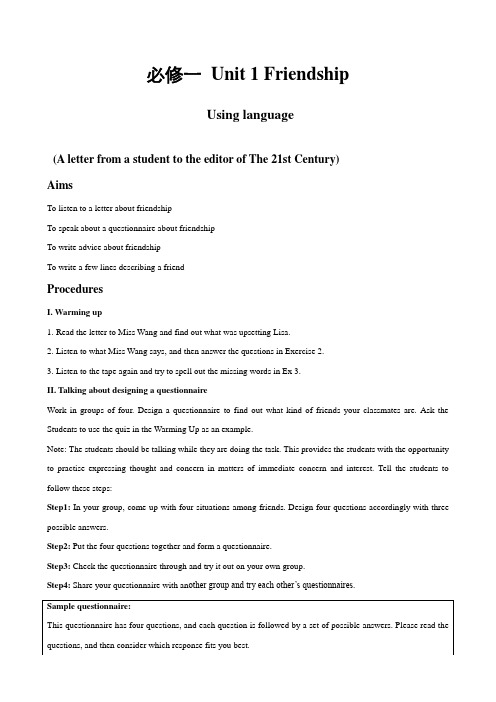
必修一Unit 1 FriendshipUsing language(A letter from a student to the editor of The 21st Century)AimsTo listen to a letter about friendshipTo speak about a questionnaire about friendshipTo write advice about friendshipTo write a few lines describing a friendProceduresI. Warming up1. Read the letter to Miss Wang and find out what was upsetting Lisa.2. Listen to what Miss Wang says, and then answer the questions in Exercise 2.3. Listen to the tape again and try to spell out the missing words in Ex 3.II. Talking about designing a questionnaireWork in groups of four. Design a questionnaire to find out what kind of friends your classmates are. Ask the Students to use the quiz in the Warming Up as an example.Note: The students should be talking while they are doing the task. This provides the students with the opportunity to practise expressing thought and concern in matters of immediate concern and interest. Tell the students to follow these steps:Step1: In your group, come up with four situations among friends. Design four questions accordingly with three possible answers.Step2: Put the four questions together and form a questionnaire.Step3: Check the questionnaire through and try it out on your own group.Step4: Share your questionnaire with an other group and try each other’s questionnaires.III. Guided writing1. Read the letter to the editor from Xiaodong and make sure you know what problem Xiaodong has.2. Discuss in groups of four. Think what advice you can give Xiaodong.3. Write your advice to Xiaodong as an editor individually.Sample writing:Dear Xiaodong,Some people like talking with others, but some people are shy. If you fall into the second group, it can be hard to make friends. But you can change the situation.What are you interested in? If you like basketball, for example, you could talk with some of your classmates who like basketball. The easiest way to start talking to people is to find something you have in common.If you are standing beside a group of your classmates, join in their discussion if you know something about the subject they are discussing. But if y ou don’t, you shouldn’t feel afraid to say, for example, “That sounds interesting, what is it about?” Once you start talking to one person, it will get easier to talk to others.Find one person you have something in common with, and once you become friends with him, his friends will start talking to you too.Good luck!EditorIV. Writing assessment1. Can you give Xiaodong some good advice?2. I s your letter well developed?3. Are your ideas well organized to the point?4. Do you have a good choice of words and idioms in your writing?5. Do you get a good mastery of complex structures of language?6. What kind of mistakes have you made in your writing? What can you do to avoid such mistakes?V. Further ApplyingHere are some proverbs about friends and friendship. Read them carefully and pay attention to the sentence stress and intonation. Then write a passage. Choose some you agree and explain why. Then choose some you disagree and explain why。
高中英语人教版高一必修1教案:_unit1friendship_using_language_教案(系列三)
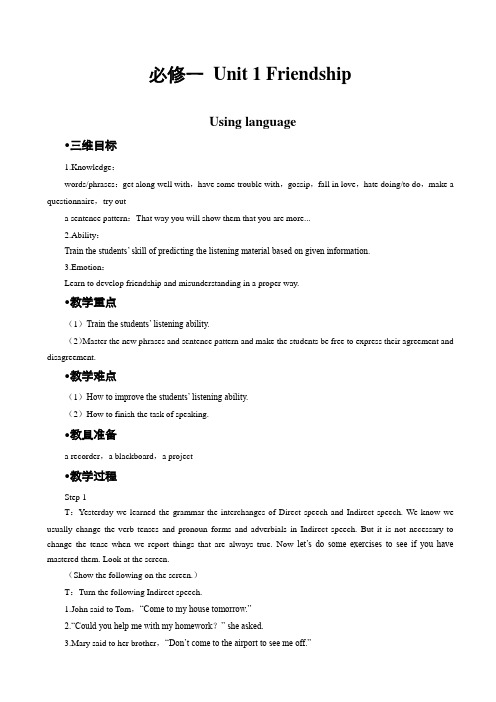
必修一Unit 1 FriendshipUsing language●三维目标1.Knowledge:words/phrases:get along well with,have some trouble with,gossip,fall in love,hate doing/to do,make a questionnaire,try outa sentence pattern:That way you will show them that you are more...2.Ability:Train the students’ skill of predicting the listening material based on given information.3.Emotion:Learn to develop friendship and misunderstanding in a proper way.●教学重点(1)Train the students’ listening ability.(2)Master the new phrases and sentence pattern and make the students be free to express their agreement and disagreement.●教学难点(1)How to improve the students’ listening ability.(2)How to finish the task of speaking.●教具准备a recorder,a blackboard,a project●教学过程Step 1T:Yesterday we learned the grammar-the interchanges of Direct speech and Indirect speech. We know we usually change the verb tenses and pronoun forms and adverbials in Indirect speech. But it is not necessary to change the tense when we report things that are always true. Now let’s do some exercises to see if you have mastered them. Look at the screen.(Show the following on the screen.)T:Turn the following Indirect speech.1.John said to Tom,“Come to my house tomorrow.”2.“Could you help me with my homework?” she asked.3.Mary said to her brother,“Don’t come to the airport to see me off.”4.The teacher said,“I must go now.”5.“Why didn’t you stop her?” he asked.T:Turn the following into Direct speech.6. She said that she would go there the next day.7. He asks whether Tom is an Englishman.8. She said that the earth is round.9. I asked Tom why he had not told her the truth.10. His aunt said that she had got there five days before.Suggested answers:1. John told Tom to go his house the next.2. She asked me if I could help her with her homework.3. Mary told her brother not go to the airport to see her off.4. The teacher said he had to/must go then.5. He asked why I hadn’t stopped her.6.She said,“I will there tomorrow.”7.He says,“Is Tom an Englishman?”8.She said,“The earth is round.”9.“Why didn’t you tell her the truth?”I asked Tom.10.His aunt said,“I got here five days ago.”T:I am glad to see you are familiar with this grammar. Now please turn to Page 6.Let’s do some listening. You are going to read a letter from Lisa first. What’s the problem with her?Read it quickly to find the answer.S1:Li sa’s classmates misunderstood her and her boy friend.S2:Lisa thought they had pure friendship,but her classmates thought they fell in love with each other.T:Quite right .Now Lisa is asking Miss Wang of Radio for Teenagers to give her some suggestions. Before listening to the tape,please guess what Miss Wang will say to Lisa. Work in groups of three to have a discussion.T:Share your ideas with the whole class.S1:Miss Wang will suggest Lisa explain their friendship to her classmates.S2:Miss Wang will advise Lisa not to pay more attention to what others say.S3:She will ask Lisa to list some possible reasons for other students’ misunderstanding.T:OK,now let’s listen to the tape. Read questions first. Then check answers with your partners and later check them with the whole class.T:Great! Read the requirements in exercise 3 to make sure what main sentences you should notice. For the second time,fill in the blanks.T:You are clever.I d like you to listen to another passage about why people write a diary. Also,first try your best to fill in the blanks and then listen to the tape. After that,check by yourselves to see how well you finished this exercise and let’s see who is the top student in this activity.T:Just now we have learned some information about how to keep friendship with your friends in a proper wayand why a diary can be our friend. But why do people make friends with one another?We are going to hear what Lesile Clark,a Canadian says. Do you agree with her?What do you think of people from foreign countries?Use the expressions listed to help you express your ideas and reasons.Step 2T:We talked much about friends and friendship. How do you evaluate a friend?What kind of friends are your classmates?Let’s make up a quiz.Version:1.You’re talking to s omeone at your locker when you see your friend approaching. She’s sporting a new hairdo that is a definite don’t.The person you’re with makes a nasty comment. Youa. announce that you think the style is great and then study it until you find something about it that you really do like.b. ignore the comment and find a time to gently break it to your friend that she might want to try something else.c. agree with the comment. After all,the style is awful.T:That’s all for discussion.Now let’s learn some lan guage points. First,pay attention to phrases:get along well with,have some trouble with,fall in love,hate doing,try out,make a questionnaire.(Write them on the blackboard.)Then we’ll learn a sentence pattern:That way you will show them that you are more(Write it on the blackboard.)Now look at their usages.(Show the following on the screen and explain them.)Would you please make up sentences using them?S1:How are you getting along in school?S2:Don’t you hate people who gossip about their friends?S3:She fell in love with the dress as soon as she saw it.S4:Try out the brakes before you drive down a hill.S5:We have much trouble with English pronunciation.T:We can use it in the following structure:(1)have some/much/little/no difficulty/trouble in doing sth.(2)There is little difficulty/trouble in doing sth.T:Look at the usage of “the way”.This is the way (that/in which)he did it.I don’t like the way you solved the problem.Step 3 Homework1.Practice speaking after class.2.Finish the workbook exercise on Page 4.●板书设计●Let students make up quizzes as many as possible. Choose some best ones to paste on the walls or put them on the internet. Who are more creative?。
高中英语人教版必修1Unit1FriendshipUsinglanguage教案(系列一)Word版
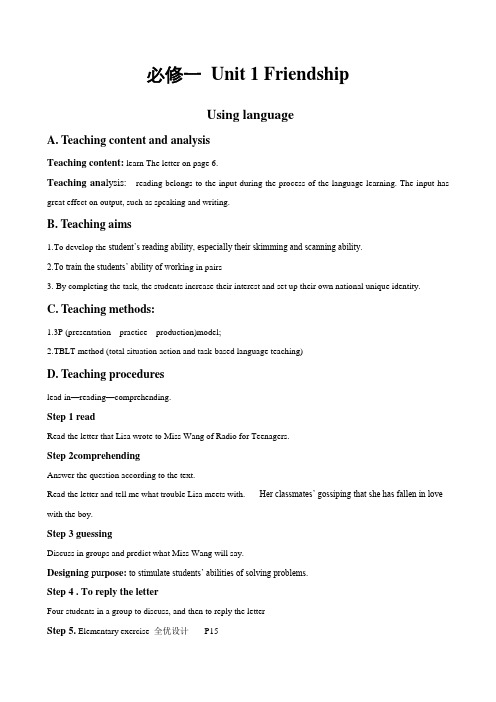
必修一Unit 1 FriendshipUsing languageA. Teaching content and analysisTeaching content:learn The letter on page 6.Teaching ana lysis:reading belongs to the input during the process of the language learning. The input has great effect on output, such as speaking and writing.B. Teaching aims1.To develop the student’s reading ability, especially their skimming and scanning ability.2.To train the students’ ability of worki ng in pairs3. By completing the task, the students increase their interest and set up their own national unique identity.C. Teaching methods:1.3P (presentation practice production)model;2.TBLT method (total situation action and task-based language teaching)D. Teaching procedureslead in—reading—comprehending.Step 1 readRead the letter that Lisa wrote to Miss Wang of Radio for Teenagers.Step 2comprehendingAnswer the question according to the text.Read the letter and tell me what trouble Lisa meets with.-----Her classmates’ gossiping that she has fallen in love with the boy.Step 3 guessingDiscuss in groups and predict what Miss Wang will say.Designi ng pur pose:to stimulate students’ abilities of solving problems.Step 4 . To reply the letterFour students in a group to discuss, and then to reply the letterStep 5. Elementary exercise 全优设计P15Step 6. consolidation exercise 全优设计P19Step 7 enhancement exerciseHobbs was an orphan(孤儿). He worked in a factory and every day he got a little money. Hard work made him thin and weak. He wanted to borrow a lot of money to learn to paint pictures, but he did not think he could pay off the debts.One day a la wyer said to him, “One thousand dollars, and here is the money.” As Hobbs took the package of notes, he wa s very dumbfounded. He didn’t know where the money came from and how to spend it. He said to himself, “I could go to find a hotel and live like a rich man for a few days; or I give up my work in the factory and do what I’d like to do: painting pictures. I could do that for a few weeks, but what would I do after that? I should have lost my place in the factory and have no money to live on. If it were a little less money, I would buy a new coat, or a radio, or give a dinner to my friends. If it were more, I could give up the work and pay for painting pictures. But it’s too much for one and too little for the other.”“Here is the reading of your un cle’s will(遗嘱),” said the lawyer, “telling what is to be done with this money after his death. I must ask you to remember one point. Your uncle has said you must bring me a paper showing exactly what you did with his money, as soon as you have spent it.”“Yes, I see. I’ll do that,” said the young man.1. Hobbs wanted to borrow money to _______.A. study abroadB. work abroadC. pay off the debtsD. learn to paint pictures2. What does the underli ned word “dumbfounded” (in Paragraph 2)probably mean?A. Surprised.B. Frightened.C. Satisfied.D. Excited.3. With the money he got, at first Hobbs _______.A. planned to have a happy life for a few daysB. decided to give up his work in the factoryC. was to give a dinner to his friendsD. had no idea what to do4. Hobbs was asked to _______.A. tell the lawyer what he did with the money after spending itB. read his uncle’s willC. tell the lawyer what was to be done with the moneyD. buy some picturesAnswers: DADAStep 8 writing1.英文建议信属于应用文写作范畴,是向征询建议者就某事提出写信人的建议和忠告。
人教版高一年级英语必修一 Unit1 Friendship-Using Language PPT课件

Problems
getting along well
trouble
have fallen in love
friendship
make good friends
communicating
lonely
dislikes Join in
重点难点探究
词汇精研
1 She found it difficult to settle and calm down in the hiding place,because she was concerned about whether they would be discovered. 她觉得在藏身的地方难以安定和平静下来, 因为她担心他们是否被发现。
because she always helps others.( F ) 2.Lisa fell in love with a boy in her class.( F )
3.Lisa wants to continue the friendship with
the boy.( T )
Ⅱ.Read the two letters and fill in the blanks.
一直到快五十岁时才安顿下来。settle down“定居
下来,过安定的生活”;set down“记下,登记”;
stay in“在家,不外出”;locate to不常见。
3 How can Linda recover from her illness in this room when it’s so dirty... 在这么脏的房间里琳达怎么能康复……
Unit 1 Section Ⅲ Using Language (人教版必修1)
精编人教版高中英语必修1教案: Unit1Friendship Using language 教案(系列三) Word版
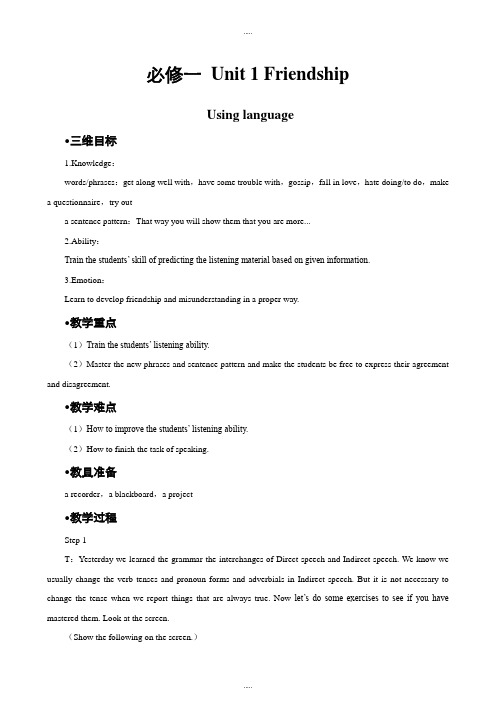
必修一Unit 1 FriendshipUsing language●三维目标1.Knowledge:words/phrases:get along well with,have some trouble with,gossip,fall in love,hate doing/to do,make a questionnaire,try outa sentence pattern:That way you will show them that you are more...2.Ability:Train the students’ skill of predicting the listening material based on given information.3.Emotion:Learn to develop friendship and misunderstanding in a proper way.●教学重点(1)Train the students’ listening ability.(2)Master the new phrases and sentence pattern and make the students be free to express their agreement and disagreement.●教学难点(1)How to improve the students’ listening ability.(2)How to finish the task of speaking.●教具准备a recorder,a blackboard,a project●教学过程Step 1T:Yesterday we learned the grammar-the interchanges of Direct speech and Indirect speech. We know we usually change the verb tenses and pronoun forms and adverbials in Indirect speech. But it is not necessary to change the tense when we report things that are always true. Now let’s do some exercises to see if you have mastered them. Look at the screen.(Show the following on the screen.)T:Turn the following Indirect speech.1.John said to Tom,“Come to my house tomorrow.”2.“Could you help me with my homework?” she asked.3.Mary said to her brother,“Don’t come to the airport to see me off.”4.The teacher said,“I must go now.”5.“Why didn’t you stop her?” he asked.T:Turn the following into Direct speech.6. She said that she would go there the next day.7. He asks whether Tom is an Englishman.8. She said that the earth is round.9. I asked Tom why he had not told her the truth.10. His aunt said that she had got there five days before.Suggested answers:1. John told Tom to go his house the next.2. She asked me if I could help her with her homework.3. Mary told her brother not go to the airport to see her off.4. The teacher said he had to/must go then.5. He asked why I hadn’t stopped her.6.She said,“I will there tomorrow.”7.He says,“Is Tom an Englishman?”8.She said,“The earth is round.”9.“Why didn’t you tell her the truth?”I asked Tom.10.His aunt said,“I got here five days ago.”T:I am glad to see you are familiar with this grammar. Now please turn to Page 6.Let’s do some listening. You are going to read a letter from Lisa first. What’s the problem with her?Read it quickly to find the answer.S1:Li sa’s classmates misunderstood her and her boy friend.S2:Lisa thought they had pure friendship,but her classmates thought they fell in love with each other.T:Quite right .Now Lisa is asking Miss Wang of Radio for Teenagers to give her some suggestions. Before listening to the tape,please guess what Miss Wang will say to Lisa. Work in groups of three to have a discussion.T:Share your ideas with the whole class.S1:Miss Wang will suggest Lisa explain their friendship to her classmates.S2:Miss Wang will advise Lisa not to pay more attention to what others say.S3:She will ask Lisa to list some possible reasons for other students’ misunderstanding.T:OK,now let’s listen to the tape. Read questions first. Then check answers with your partners and later check them with the whole class.T:Great! Read the requirements in exercise 3 to make sure what main sentences you should notice. For the second time,fill in the blanks.T:You are clever.I d like you to listen to another passage about why people write a diary. Also,first try your best to fill in the blanks and then listen to the tape. After that,check by yourselves to see how well you finished this exercise and let’s see who is the top student in this activity.T:Just now we have learned some information about how to keep friendship with your friends in a proper way and why a diary can be our friend. But why do people make friends with one another?We are going to hear what Lesile Clark,a Canadian says. Do you agree with her?What do you think of people from foreign countries?Use the expressions listed to help you express your ideas and reasons.Step 2T:We talked much about friends and friendship. How do you evaluate a friend?What kind of friends are your classmates?Let’s make up a quiz.Version:1.You’re talking to s omeone at your locker when you see your friend approaching. She’s sporting a new hairdo that is a definite don’t.The person you’re with makes a nasty comment. Youa. announce that you think the style is great and then study it until you find something about it that you really do like.b. ignore the comment and find a time to gently break it to your friend that she might want to try something else.c. agree with the comment. After all,the style is awful.T:That’s all for discussion.Now let’s learn some lan guage points. First,pay attention to phrases:get along well with,have some trouble with,fall in love,hate doing,try out,make a questionnaire.(Write them on the blackboard.)Then we’ll learn a sentence pattern:That way you will show them that you are more(Write it on the blackboard.)Now look at their usages.(Show the following on the screen and explain them.)Would you please make up sentences using them?S1:How are you getting along in school?S2:Don’t you hate people who gossip about their friends?S3:She fell in love with the dress as soon as she saw it.S4:Try out the brakes before you drive down a hill.S5:We have much trouble with English pronunciation.T:We can use it in the following structure:(1)have some/much/little/no difficulty/trouble in doing sth.(2)There is little difficulty/trouble in doing sth.T:Look at the usage of “the way”.This is the way (that/in which)he did it.I don’t like the way you solved the problem.Step 3 Homework1.Practice speaking after class.2.Finish the workbook exercise on Page 4.●板书设计●活动与探究Let students make up quizzes as many as possible. Choose some best ones to paste on the walls or put them on the internet. Who are more creative?。
新人教版必修一Unit1Friendship-UsingLanguage[优秀教案]
![新人教版必修一Unit1Friendship-UsingLanguage[优秀教案]](https://img.taocdn.com/s3/m/3cb684cc18e8b8f67c1cfad6195f312b3169eb06.png)
新人教版必修一Unit1Friendship-UsingLanguage[优秀教案]第一篇:新人教版必修一 Unit 1 Friendship-Using Language[优秀教案]Unit 1 Friendship Period 6 Using Language(Listening and Writing)整体设计从容说课This is the sixth teaching period of this unit.We can first review some important language points the students learned in the last several periods.The emphasis of this period should be laid on listening and writing.They are expansion of the topic of the text.Listening is about Lisa’s problem of making a friend with a boy.She asks Miss Wang for advice.Through listening and exercise, students learn how to give advice and the skill of giving advice.And also let them think about the problem of boy’s making friends with girls and girls with boys.And then design a task to ask students to give advice according to the different problems to develop their ability to solve the problems.All of these lay the foundation for the next task—writing.In this way, students feel that they have information to put out.And writing makes for the improvement of students’ writing ability, strengthening their comprehension of friendship.The two letters, listening and letter writing prepare students to further talk about friendship, especially the problems with misunderstanding, and unfriendliness, thus strengthen students’ abilities to practice language, discover, and solve problems.教学重点Develop the students’ listening ability, especially listening to and understanding key words and speakers’ intent ion andattitude.教学难点Develop the students’ writing skills by reading, discussing and writing a letter to give advice on friendship.教学方法1.Task-based teaching and learning2.Cooperative learning3.Discussion 教具准备A tape recorder and other normal teaching tools 三维目标Knowledge aims: 1.Get the students to learn the following new words and useful expressions.teenager get along with fall in love advice questionnaire quiz editor communicate habit 2.Get the students to know how to write a letter to offer advice.Ability aims: 1.Enable the students to listen and understand the listening materials.2.Enable the students to write a letter to offer advice on friendship.Emotional aims: Develop and improve the students’ ability to help others solve such problems as how to communicate with people, how to make and be good friends, and so on.教学过程设计方案(一)→Step 1 RevisionHave a dictation about new words and expressions:ignore calm cheat loose concern suffer purpose entirely teenager trust hide away set down according to face to face go through a series of in order to walk the dog get along with add up →Step 2 Reading and listening(on Page 6)1.Lead-in Talk freely with the students to lead in the listening topic.Just like the following: Do you remember what Ann’s best friend is? Is it a man or a thing?Guess what my best friend is.(Say something about music, pets or plants.)So you see a man can make friends with anyone and anything.Then boys, would you like to make friends with girls? Girls, would you like to make friends with boys? What kind of girl would you like to make friends with? And what kind of boy wouldyou like to make friends with? If you see a boy classmate makes a friend with a girl, will you say something about them behind?(If no, you are kind.If yes, you are a gossiper.)If you are that boy or girl, would you like to be gossiped about? 2.Reading Read the letter.Lisa has such a problem.She is asking you for help.What advice will you give? You are given 2 minutes to discuss in groups and then offer your group’s opinions.3.Listening Tell the students:Besides you, Lisa also asks Miss Wang of Radio for Teenagers for help.What advice does Miss Wang give to Lisa? Let’s listen to what she says.Listen for 3 times and do listening exercises.A fourth time for checking.4.Post-listening Tell the students:Do you think Miss Wang’s advice is helpful? Now suppose you are editors of Radio for Teenagers, here are some problems for you to offer advice.Show the following on the screen.Tell the students they can choose any problem as they like to write down their advice.1.I don’t have enough pocket money.2.I’m not satisfied with my appearance.3.My desk mate has lost a reference book, she thinks that I’m a thief.4.I work hard but I hardly make progress.5.I want to travel to Wu Zhen Town with m y fiends this weekend, but my parents don’t allow me to go.6.I don’t like the way Mr.Li teaches us English, so I’m not interested in English any longer.7.My mother has just given birth to my little brother.I’m worried that the baby will rob me of my parent s’ love and even everything.8.I quarreled with my best friend 3 days ago.Up to now, we haven’t said a word to each other.9.I’d like to be monitor, but at the same time I doubt whether I have such ability.10.I’m often late for school.The teacher is so angry that he threatens that if I’m late again, I will be dismissed.Ask several students to report their advice.→Step 3 Writing(on Page 7)1.Pre-writing 1)Read a letter from a student named Xiaodong.Go through the directions on Page 7.2)Brainstorm with a partner about ways to change the situation.Make a list of the ideas and give reasons.3)Decide which are the best ideas and put them into the right order.2.While-writing Ask the Ss to write a letter to Xiaodong and give him some advice.Suggested steps: 1)Read the sample and the expressions.2)Begin to write the letter to Xiaodong.3)Revise your letter by yourself.4)Exchange your writing paper with your partners and correct the mistakes you have made.5)Get back your own writing paper and write the letter again.3.Post-writing Have a discussion in groups.1)Can you give Xiaodong some good advice? 2)Is your letter well developed?3)Are your ideas well organized to the point? 4)Do you have a good choice of words and idioms in your writing? 5)Do you get a good mastery of complex structures of language? 6)What kind of mistakes have you made in your writing? What can you do to avoid such mistakes? Choose some students’ writing paper and show them in the class.Ask the Ss to correct the mistakes together and also learn from some good writings.→Step 4 WorkbookWriting task(on Page 46)1.Read the proverbs, explain them and ask the students to choose some they agree with and some they disagree with and explain why.2.Discuss with their partner and then write a passage according to the sample story and “Analyzing the structure”.→Step 5 Homework1.Finish off the workbook exercises.2.Write a short passage about your friend.板书设计Unit 1 Friendship Listening and Writing new words and expressions writing steps teenager get along with fall in love advice 1.Make a list of the information.questionnaire quiz editorcommunicate habit 2.Begin to write the letter.3.Revise your letter....活动与探究Get the students to hold a group writing competition out of class.Ask them to describe one of their friends—their appearance, personality, hobbies, etc.This activity makes for the improvement of students’ writing ability, strengthening their comprehension of friendship, and also developing their cooperative spirit and sense of competition.Sample description: I have a few good friends, but I think Miki is my best friend.We both read a lot and we’re very interested in films.We spend a lot of time watching videos and talking about films and books.She works hard.She is very helpful.Whenever I am in trouble, she will help me out...第二篇:《小狗包弟》教案_新人教必修一金太阳新课标资源网小狗包弟巴金金太阳新课标资源网金太阳新课标资源网鲜明的特质与基调。
高中英语人教版高一必修1教案:_unit1friendship_using_language_教案(系列四)
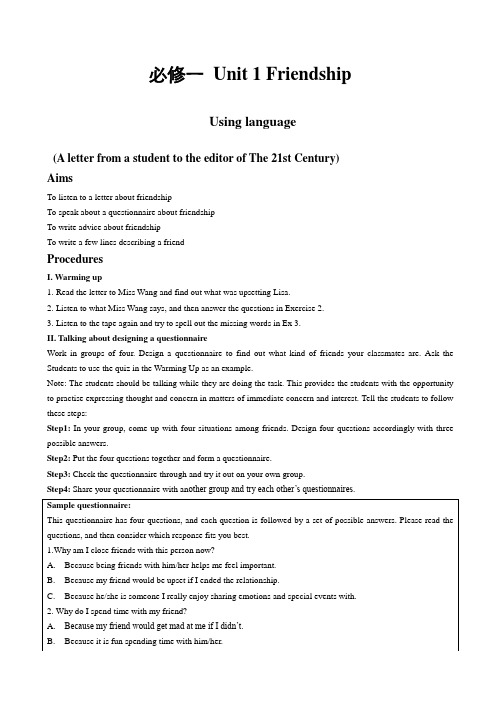
必修一Unit 1 FriendshipUsing language(A letter from a student to the editor of The 21st Century)AimsTo listen to a letter about friendshipTo speak about a questionnaire about friendshipTo write advice about friendshipTo write a few lines describing a friendProceduresI. Warming up1. Read the letter to Miss Wang and find out what was upsetting Lisa.2. Listen to what Miss Wang says, and then answer the questions in Exercise 2.3. Listen to the tape again and try to spell out the missing words in Ex 3.II. Talking about designing a questionnaireWork in groups of four. Design a questionnaire to find out what kind of friends your classmates are. Ask the Students to use the quiz in the Warming Up as an example.Note: The students should be talking while they are doing the task. This provides the students with the opportunity to practise expressing thought and concern in matters of immediate concern and interest. Tell the students to follow these steps:Step1: In your group, come up with four situations among friends. Design four questions accordingly with three possible answers.Step2: Put the four questions together and form a questionnaire.Step3: Check the questionnaire through and try it out on your own group.Step4: Share your questionnaire with an other group and try each other’s questionnaires.1. Read the letter to the editor from Xiaodong and make sure you know what problem Xiaodong has.2. Discuss in groups of four. Think what advice you can give Xiaodong.3. Write your advice to Xiaodong as an editor individually.Sample writing:Dear Xiaodong,Some people like talking with others, but some people are shy. If you fall into the second group, it can be hard to make friends. But you can change the situation.What are you interested in? If you like basketball, for example, you could talk with some of your classmates who like basketball. The easiest way to start talking to people is to find something you have in common.If you are standing beside a group of your classmates, join in their discussion if you know something about the subject they are discussing. But if y ou don’t, you shouldn’t feel afraid to say, for example, “That sounds interesting, what is it about?” Once you start talking to one person, it will get easier to talk to others.Find one person you have something in common with, and once you become friends with him, his friends will start talking to you too.Good luck!EditorIV. Writing assessment1. Can you give Xiaodong some good advice?2. I s your letter well developed?3. Are your ideas well organized to the point?4. Do you have a good choice of words and idioms in your writing?5. Do you get a good mastery of complex structures of language?6. What kind of mistakes have you made in your writing? What can you do to avoid such mistakes?V. Further ApplyingHere are some proverbs about friends and friendship. Read them carefully and pay attention to the sentence stress and intonation. Then write a passage. Choose some you agree and explain why. Then choose some you disagree and explain why。
人教版高中英语必修一Unit1 Friendship Using language 课件(共24张P
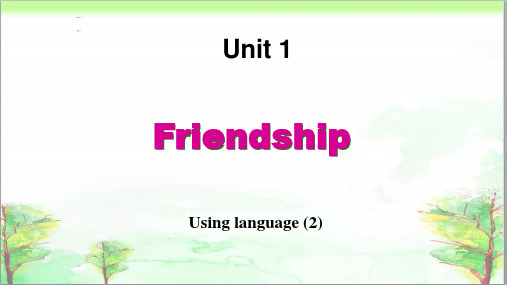
Discussion
1. Can you find similar things in your hometown?
2. How do you show friendship to visitors?
The ways to show friendship
present a hada Tibetan
friendship?
在邮政金融客户答谢会上的发言 各位领导、各位嘉宾、各位朋友: 今天是xx邮政局的金融客户的小聚会, 出席今 天的活 动都是 长期以 来对我 局的金 融 发展给予大力帮助和支持的各位嘉宾 朋友,首 先我代 XX邮政 向各位 贵宾朋 友的光 临 表示热烈的欢迎和衷心的感谢! **是一个百年老店,xx邮政以服务Xx地 区和XX地区为 主,服务 遍布每 个角落 ,金融 服 务产品已包括代理销售保险理财产品, 我们发 展离不 开在座 各位的 关注和 支持,你 们 的支持是我们邮政发展的最大动力,我 们的金 融服务 已涉足 各行各 业,我们 的合作 伙 伴国人寿保险公司推出的保险理财产 品,更符 合新时 期各位 嘉宾的 理财配 置需要, 期 望国邮**国人寿的强强合作,为各位带 来财富 和保障, 今天邀 请了的 理财专 家为大 家 带来一堂理财讲座,我们的理财专家来 自已多 间银行 市场部 经营顾 问,通过 大家的 沟 通和研讨,为大家带来一个开心的聚会 。 XX邮政的发展离不开各位朋友的支持, 希望在 座的各 位朋友 在以后 的日子 能更加 关 注我们,更加支持我们,你们的每一分支 持都将 激励我 们更加 努力地 工作, 努力打 造 **金融服务品牌,通过我们的服务惠及 广大客 户,让邮 政金融 服务通 过我们 的传递 得 到充实和延伸,在此我代表XX**局向对 给予我
aloha
- 1、下载文档前请自行甄别文档内容的完整性,平台不提供额外的编辑、内容补充、找答案等附加服务。
- 2、"仅部分预览"的文档,不可在线预览部分如存在完整性等问题,可反馈申请退款(可完整预览的文档不适用该条件!)。
- 3、如文档侵犯您的权益,请联系客服反馈,我们会尽快为您处理(人工客服工作时间:9:00-18:30)。
----A letter of者就有关问题进行分析并针对 这些问题提出自己的看法和建议。
2. 对象: 1)写给个人,就其遇到的某个问题提出自己 的看法和观点; 2)写给某个组织和机构,就改进其服务提出 建议或忠告。
3. 基本框架:
开头(beginning)---- 开门见山,向对方陈 述自己的观点.(state your idea)
I’m writing to express my views concerning our school’s decision that all physical education should be cancelled.
1. 我理解学校是为了我们更好的迎接期末考试,而取消 了体育课。
但是
1.体育教育属于我们教育的一部分。 2. 体育课能丰富学校的生活。 3.我们要在学习和健身上取得平衡。我们需要放松的方 式,以便能够提高学习效率。
2. 只工作不玩耍聪明的孩子也变傻。 3. 体育运动能让我们有健康的身体。
My reason are as follows:
C.建议信结尾常用句式
1. I believe you will take my advice into account解 释/consideration. 2. I hope you will find these proposals建议 /suggestions /recommendations推荐practical/useful/helpful. 3. I will be more than happy to see improvements in this regard就这点而言. 4. I would appreciate感激的 it very much if you could consider my suggestions.
• Practice makes perfect
• Never give up/lose heart
• If you have any trouble, please turn to me for help向我求助.
• I’d like to share my methods with you.
• Only in this way, can you learn English well
主体(body)---- 对所提出的问题进行分析并说 明理由,接着提出自己的建议(reasons and evidence)
结尾(ending)---- 呼应开头,重申观点(restate your opinion.)
4. 注意事项:
1)建议信要写出写信的原因,建议的内容,提出 建议的理由,提出的理由要入情入理,语气一定要 礼貌当先。因此建议信要写得简明扼要、目的明确、 具有合理性和说服力
with, which is a good way of letting your anger out wit hout hurting others or yourself. Second, you can go outdoors and play team games with your friends as physical exercise, which is an effective way to get rid of anger. Last but not least, you need to remain optimistic about your future. Having a positive attitude towards life can be helpful in lifting your spirits.
• read novels, magazines and everything to do with English
1. What's more, you are supposed to take an active p art in outdoor activities to relax. 2. Carried by two, burdens are lighter. 3. It’s high time that you should relieve your pressure. 4. Measures are supposed to be taken to control your temper. 5. It’s common for teenagers like you to lose your te mper, which of co urse will have a bad effect on your normal study and life.
2)建议的角度要多样化,避免重复。可从政治、 经济、文化、伦理、法律以及个人等多角度给出建 议。
3)符合英文信件的基本格式
常用套语
A.建议信开头常用句式 (照应材料,表明写作意图)
1.After I read your letter in the newspaper, I am sorry to know that … 2.I am very glad to hear that you want to… 3.I know you have trouble in…after reading
your letter
4.I am writing to you for the purpose of -----
5. I am writing to share some advice with you.
B. 表达建议(body)
1 .I think it would be more beneficial if you could … 2. I would like to suggest/recommend that… 3. I wonder if you have considered the following tips. 4. When it come to such a situation, I would like to suggest that you …
书面表达如何写?
三 Step 1 List the key points
个
Step 2 Make sentences
步
骤 Step3. Form a passage and polish
点睛之笔:
• Nothing is impossible to a willing heart有 智者=有心人!
I hope you'll soon become calmer and better. Yours, Jamie
为了迎接即将到来的期末考试,你校要取消所有的体 育课。请你以学生王丽的身份给校长写一封信,建议 不要取消体育课。
注意:1. 词数:120左右;
2. 文章的开头已给出,不计入总词数。
Dear Headmaster,
I'm sorry to know that you're having such a bad time at the moment. Thetruth is that everyone will have one o f those periods when things seem to be going wrong, I quite understand how you ar e feeling now and there is no need to worry about it so much. The im portant thing is to learn to control your temper so that you may not do or say anything you’ll regret. Here are three useful tips. First of all, talking to someone you trust about the trou ble you're faced
